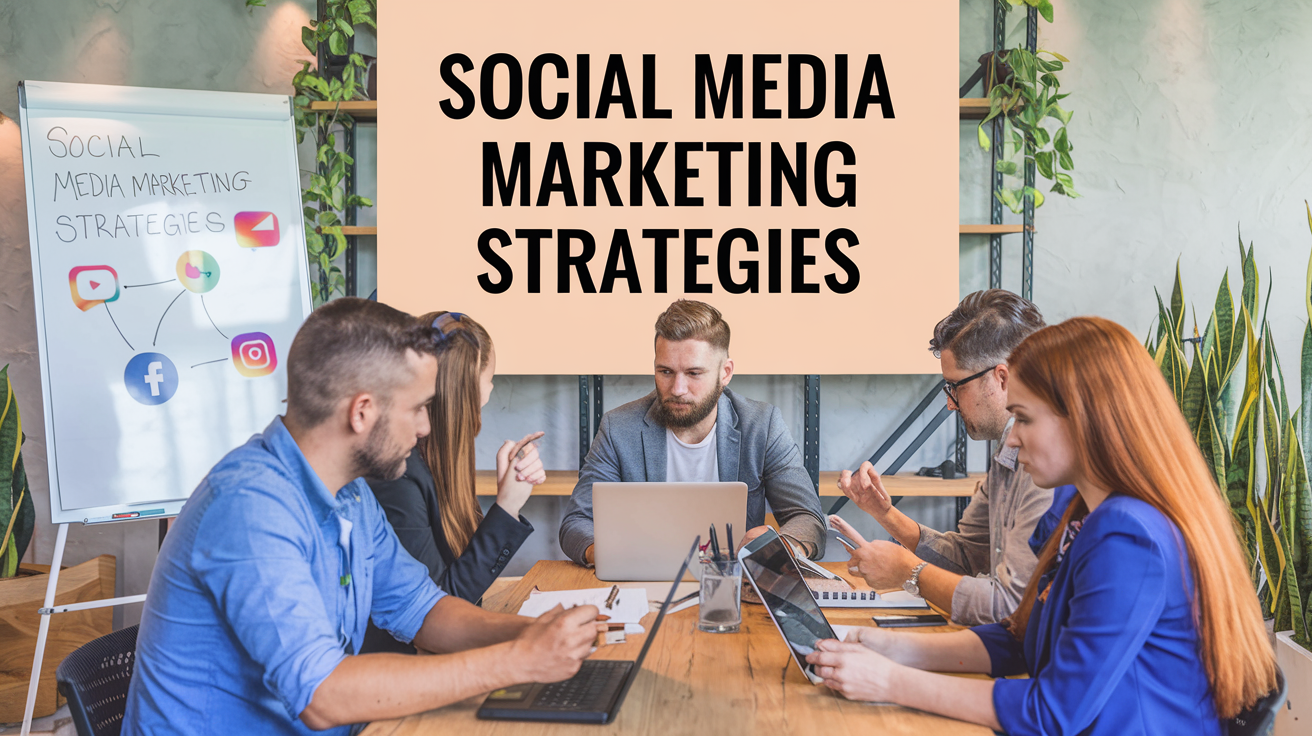Social media marketing involves using social media platforms to promote your products, services, or brand. It includes creating and sharing content (such as text, images, videos, and infographics) and engaging with users through comments, direct messages, and posts.
The ultimate goal of social media marketing is to build your brand, increase traffic to your website, generate leads, and boost sales.
In today’s digital landscape, social media marketing (SMM) has become one of the most powerful tools for businesses of all sizes. With billions of users on platforms like Facebook, Instagram, Twitter, and LinkedIn, social media allows brands to connect directly with their audience, build relationships, and drive growth.
- Key Components of Social Media Marketing
- Content CreationThe heart of any social media strategy is the content you create. This can include:
- Blog posts
- Infographics
- Videos (live or pre-recorded)
- Polls and interactive stories
- User-generated content
- Community EngagementInteracting with your audience by responding to comments, answering questions, and joining conversations helps foster brand loyalty and builds trust with your followers.
- Paid AdvertisingMost social media platforms offer paid advertising options, allowing you to target specific audiences with precision. Ads can be customized based on demographics, interests, and behaviors to ensure your message reaches the right people.
Analytics and InsightsSocial media platforms offer insights into the performance of your content, such as engagement rates, reach, and click-through rates. These metrics allow you to refine your strategy and optimize for better results.
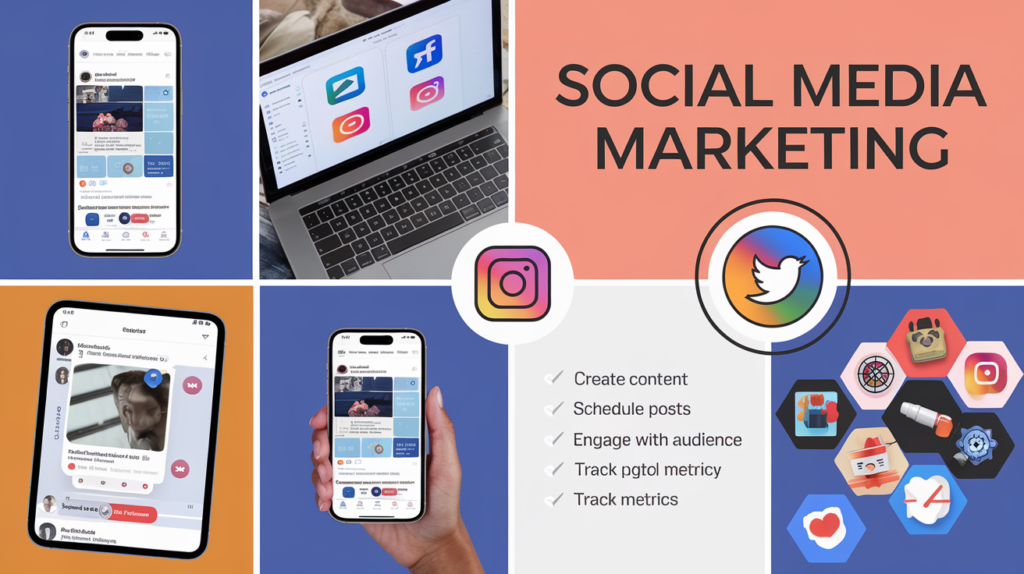
- Benefits of Social Media Marketing
- Increased Brand AwarenessBy consistently posting valuable content and engaging with your audience, your brand becomes more recognizable and top-of-mind for potential customers.
- Improved Customer RelationshipsSocial media offers a direct line of communication with your audience, allowing for quick responses to queries, feedback, and concerns, which builds customer loyalty.
- Higher Conversion RatesEngaging content and paid ads drive users from social platforms to your website, increasing the likelihood of conversions, whether that means a purchase, sign-up, or other desired action.
- Cost-Effective MarketingCompared to traditional advertising, social media marketing is highly cost-effective. Even with a modest budget, you can reach a wide audience, thanks to targeted advertising and organic reach.
- Better Audience InsightsSocial media platforms provide detailed insights into your audience’s behaviors, preferences, and demographics, allowing you to tailor your messaging more effectively.
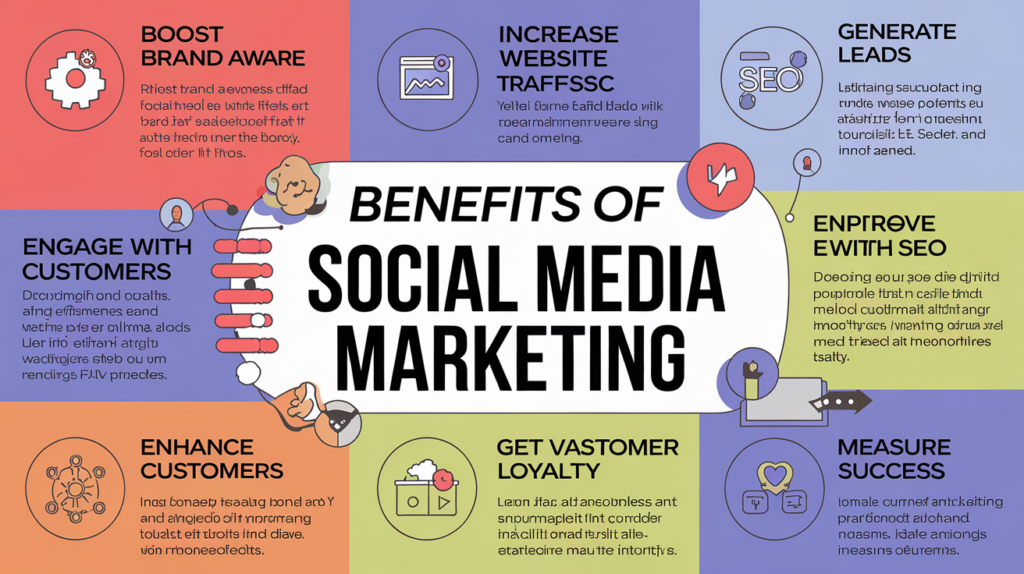
- Best Practices for Social Media Marketing
- Consistency is Key: Maintain a regular posting schedule to stay visible and engage your audience.
- Quality over Quantity: It’s better to post less frequently with high-quality, engaging content than to post more often with low-quality material.
- Leverage User-Generated Content: Encourage your followers to share their experiences with your product and feature them on your feed. This boosts engagement and trust.
- Stay on Top of Trends: Social media trends change rapidly. Keep up with what’s popular to stay relevant and engage your audience in new, creative ways.
- Monitor Competitors: Stay informed about your competitors’ social media activities to identify what works and adapt it for your own brand.
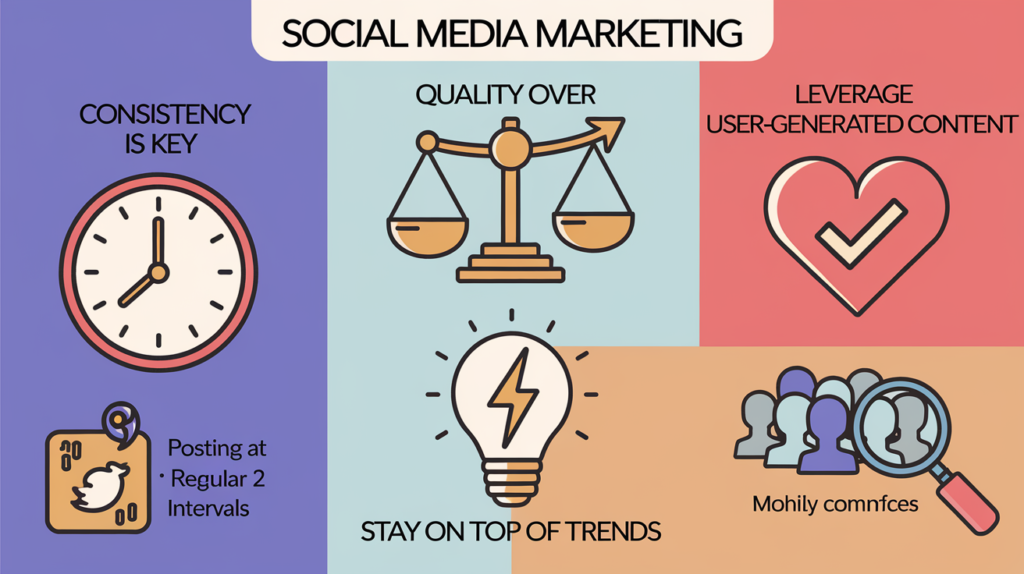
- Popular Social Media Platforms and Their Uses
- Facebook: Great for community building, sharing diverse content (posts, videos, events), and running ads targeting specific demographics.
- Instagram: Best for visual content like photos, videos, and Stories. Perfect for brands targeting younger audiences.
- Twitter: Ideal for real-time updates, industry news, and direct engagement with customers.
- LinkedIn: Focused on B2B marketing, networking, and professional content sharing.
- TikTok: Popular for short-form, creative video content. Excellent for brands aiming to engage with a younger, trend-driven audience.
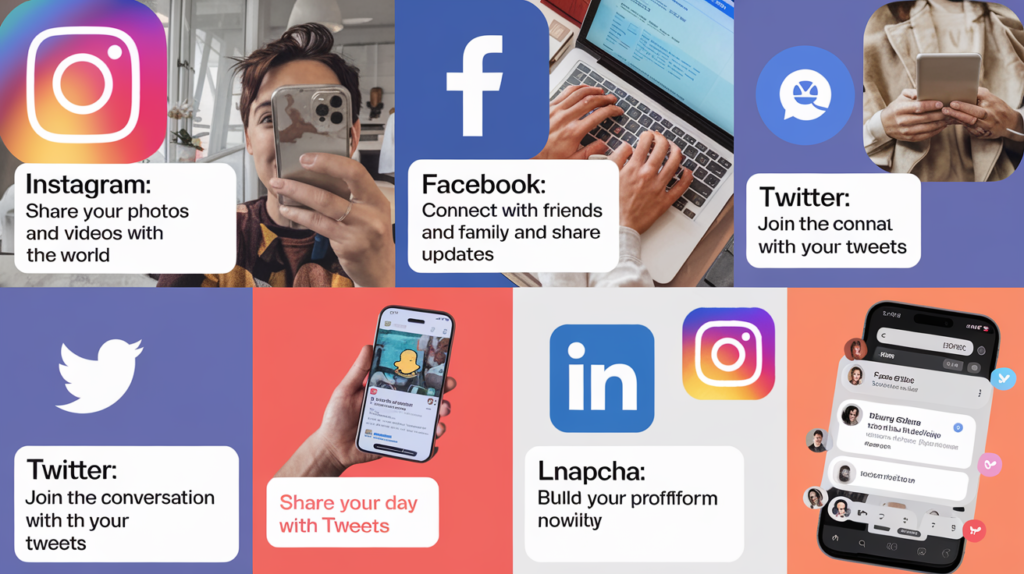
FAQ’s
What is social media marketing?
Social media marketing involves using social media platforms to promote a brand, product, or service. It includes creating and sharing content, engaging with users, running ads, and analyzing performance to achieve marketing goals.
2. Why is social media marketing important?
Social media marketing helps businesses reach a larger audience, build brand awareness, engage with customers, and drive traffic to their websites. It also provides valuable insights into customer behavior and preferences.
3. Which social media platforms should I use for marketing?
The choice of platforms depends on your target audience and business goals. Popular platforms include Facebook, Instagram, Twitter, LinkedIn, TikTok, and Pinterest. Each platform has its own user demographics and features.
4. How often should I post on social media?
Posting frequency depends on the platform and your audience. For instance, posting 1-2 times per day on Facebook and Instagram is common, while Twitter may require multiple posts daily. Consistency is key.
5. What type of content should I share?
Content types can include blog posts, images, videos, infographics, polls, and stories. Your content should be engaging, relevant, and aligned with your brand’s voice and goals. It’s important to mix content types and monitor what resonates with your audience.
6. How can I measure the success of my social media marketing efforts?
Success can be measured through various metrics such as engagement rates, click-through rates, follower growth, conversion rates, and return on investment (ROI). Most social media platforms offer analytics tools to track these metrics.
7. What are some common mistakes to avoid in social media marketing?
Common mistakes include inconsistent posting, neglecting engagement with followers, not having a clear strategy, over-promoting products, and failing to analyze performance. Avoiding these pitfalls can improve your social media presence.
8. How can I increase my social media following?
Increasing your following can be achieved through strategies like running contests, collaborating with influencers, using relevant hashtags, creating shareable content, and engaging with your audience regularly.
9. What role do hashtags play in social media marketing?
Hashtags help categorize content and make it discoverable by users interested in those topics. Using relevant and trending hashtags can increase the visibility of your posts and attract a broader audience.
10. How do I handle negative comments or reviews on social media?
Responding professionally and promptly to negative comments is crucial. Address the issue respectfully, offer solutions if applicable, and take the conversation offline if needed. This approach can help maintain a positive brand image.
11. What is a social media marketing strategy?
A social media marketing strategy outlines your goals, target audience, content plan, posting schedule, and metrics for success. It provides a roadmap for your social media efforts and helps ensure consistency and effectiveness.
12. How can I stay updated with social media trends and changes?
Staying updated involves regularly reading industry blogs, following social media news, attending webinars and conferences, and joining relevant professional groups. Social media platforms often update their features, so keeping informed is essential.
13. Should I use paid advertising on social media?
Paid advertising can be highly effective in reaching a targeted audience and achieving specific goals, such as increasing brand awareness or driving sales. It allows for precise targeting and measurable results, but it should be part of a balanced strategy.
14. How can I create engaging content for social media?
Engaging content is relevant, visually appealing, and resonates with your audience’s interests and needs. Use high-quality images, compelling copy, and interactive elements like polls or quizzes. Storytelling and authenticity also help create stronger connections.
15. What are social media algorithms, and how do they impact my posts?
Social media algorithms determine which posts are shown to users based on factors like engagement, relevance, and timeliness. Understanding and optimizing for these algorithms can help increase the visibility and reach of your content.

